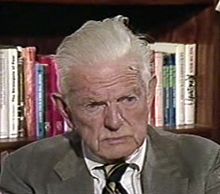Norman Dodd
 | |
| Born | June 29, 1899 |
| Died | January 1, 1987 (Age 87) |
| Alma mater | • Phillips Academy • Yale |
| Exposed | |
Bank manager and congressional investigator who exposed how tax-exempt foundations were subverting the United States Government by other than constitutional means. He then proceeded to show that this applied to the Ford Foundation, Rockefeller Foundation, and Carnegie Endowment. | |
Norman Paul Dodd was a banker/bank manager, worked as a financial advisor, and was chief investigator in 1953 for the Special Committee on Tax Exempt Foundations (commonly referred to as the Reece Committee), which was chaired by U. S. Congressman B. Carroll Reece. Dodd was known primarily for his investigation into tax-exempt foundations.
| "How the Banker Run Foundations are Shaping the World - Norman Dodd Reece" - G. Edward Griffin interviews Norman Dodd, who was the congressional Director of Research for the Reece Committee, 1953-1954.[1] |
Career
Norman Dodd had an his unusual career, which started in banking, until after investigating the circumstances surrounding the great financial crash of 1929, he reported to his bank's directors that banking would never be stable until the money system was radically reformed. Offered something of a sinecure for his silent acquiescence, he resigned only to discover that no US banks would employ him.
He is remembered for his report to the 1953 Reece Committee on Foundations, he began with a definition of "subversive", saying that the term referred to "Any action having as its purpose the alteration of either the principle or the form of the United States Government by other than constitutional means." He then proceeded to show that this applied to the Ford Foundation, Rockefeller Foundation, and Carnegie Endowment.[2]
He stated in his findings[3] that many foundations were intentionally campaigning to involve the United States in such wars as World War I and that they also sought ways to warp American teaching of history through explicit control of the education system in the United States.